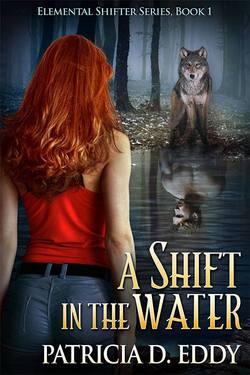 Title: A Shift in the Water, Elemental Shifter Series Book 1 Author: Patricia D. Eddy Genre: Paranormal Romance Cade Bowman leads a small werewolf pack in Bellingham, Washington. Or he did, before a fire elemental intent on revenge traps him as his wolf. His pack gone, held prisoner by the elemental's charms, he knows death is coming for him. Mara Taylor is dying. A mysterious blood disorder is taking her life and her doctors can't seem to stop it. Only her daily swims offer her any relief. Resigned to her fate, she heads to Orcas Island for one last swim. When Cade's wolf finds Mara, he knows instinctively that she's the key to freeing him from the fire elemental's charm. She's more than that. She's his. Can Mara free Cade his wolf and save her own life in the process? And if she does, can they survive when they learn the identity of the fire elemental hunting them both? The ReviewWhen I picked up A Shift in the Water by Patricia D. Eddy, I couldn't put it down. I felt sad when I went to work and had to leave my Kindle behind. When I got back home, I sat with my back against the stove so I didn't burn dinner. I still burned dinner, but it was barely burned. If I hadn't stuck so close to the meal, it would have fused to the pan. Cade was trapped and tormented, a woman was facing the end of her life with as much dignity as possible, and yes, there was sexual tension. There wasn't time to stand over a sauce pan and stir! The story and building romance kept me turning the pages, but I couldn't help but identify with Mara. So many of the symptoms she faced mirrored systemic lupus, and were things I've experienced. I was really impressed with how well Eddy captured the emotions of someone steeped in illness. The struggle to find a diagnosis is exhausting on its own without the fatigue that often comes with chronic health issues. I could relate to Mara's refusal to move in with her friends, and reluctance to rely on others. It wasn't about trust. It was about independence. Going off to think by herself, even though it was dangerous, made sense. Every time she went against doctor's orders, it was believable. Because of the paranormal elements, when her struggles continue to grow in intensity, there was still hope. This book is a great example of why I love the paranormal. I can't think of a reason to not read this book. If you like interesting characters with a lot of depth or people who face adversity with grace and determination, you will like A Shift in the Water. About the Author Patricia D. Eddy can't stop writing. Not that she's tried. Her characters won't let her. She fuels her writing with copious amounts of caffeine-she lives in Seattle, after all-and rewards herself with good Scotch and red wine. In between writing, editing, and mentoring other authors, she runs around lakes, reads late into the night, and is terribly addicted to Doctor Who and Sherlock. She has a thing for quirky British men and isn't ashamed to admit it. Her quirky-but-not-British husband never gives her grief for working long hours or occasionally talking to herself when she has disagreements with her characters, for which she is very thankful. Patricia D. Eddy's...... Website | Twitter | Facebook
0 Comments
by Camela Thompson I was listening to the radio the other day, and there was a commercial for a local costume shop that went something like this: **ditzy woman's voice** Should I be the sexy nurse? Or should I be the slutty nurse? Despite the set up, this is not a rant about the objectification of women on Halloween. I have no problem with women expressing their sexual side and embracing their bodies by showing them off. If you want to wear that micro skirt, you go girl. What I do wonder is why men don't do the same. Men are viewed as "hot" fully clothed in a three-piece suit, but their date has to wear the bare minimum to get the same reaction. What is up with that? When I Googled "male vampire costume," images of fully clad men concealed with full body capes filled page after page. When I Googled "female vampire costume," I got this: None of the naughty bits are hanging out, but no one is fooled by the sheer spider web material. The corset still presents the girls front and center, and those long stems are on display. What do you think you get when you Google "sexy male vampire costume"? This: The pants are baggy, but there's less of a cape. Show us that tailored suit! Yeah! Come on. Really? I said "sexy vampire," not "fully clothed and concealed hotness." Those aren't even tear away pants. That might have made it better. The same search for women got me this: Am I making my point? In order for her to be sexy, we have a corset and a skirt that is threatening to spill her bum out from the bottom. "Slutty vampire female costume" displayed more of the same with a few variations that just offered a little bit of latex. In order to call the "sexy costume" images even, there needs to be much less material for the men. And probably leather. And maybe some fishnet.... What kind of costumes would you like to see out there? Do you think it's good that men focus on costumes that are entertaining or macho rather than something to attract the opposite sex? Or do you think the intent to attract the opposite sex is there and we just aren't communicating clearly?
by Camela Thompson A couple of weekends ago, my friend and I attended Geek Girl Con in Seattle. It was awesome. They had some really great panels, but a lot of our time was spent perusing the booths of artwork, t-shirts, jewelry, games, and oggling a number of people in full costume. My favorites were Maleficent, the Queen of Hearts, and some really awesome costumes of fae. One woman had gorgeous long blue hair with intricate ebony antlers climbing from her skull above pointed ears. For every unique creature, there were several that were very recognizable. Copyright infringement abounded. As I was purchasing some beautiful artwork, I found myself biting my tongue. I wanted to ask if they had contacted all of the copyright holders for the pieces they were reproducing, but I was pretty certain I already knew the answer. Geek Girl Con really knows their audience With Halloween fast approaching, I've been thinking a lot about costumes and cosplay (for more on what cosplay is, go here). It's rare to see authors rant about cosplay, but I've seen it happen. While the author of the particular rant I have in mind had valid points about copyright infringement and misrepresentation, I couldn't understand why she was focused on cosplay. I've seen work that was very close to her own in really bad, low budget movies that are available through common movie providers. Other works get spun off in fan fiction, possibly robbing the author of an opportunity to explore a character's story on their own. Artists sell paintings, prints, and t-shirts with images and creatures torn off the big screen. Artwork, fan fiction, and movies all stand a chance to take a share of the author's profit. My vision of Olivia's party dress from Book 1. So much bead work...This is why I don't cosplay. Cosplayers don't manufacture their costumes for profit, although there are some lucrative prizes in contests. I still doubt it makes up for the cost poured into years of costumes. Cosplayers also don't tend to make costumes in bulk to sell to other fans. It's too expensive, and the whole point of the exercise is to express their love for a character. While a lot of money can go into manufacturing a costume, generally cosplayers make their own from scavenged materials and it's used as an expression of self. The material shouldn't be sheer, but working with templates is interesting I would be honored if someone loved my work enough to bring it to cosplay. Honestly, it's on my bucket list. All I ask is that I get a picture so I can share it. It's not done for profit, it gets the word out about my books, and it's very flattering. The motive behind the act has everything to do with my reaction. Fan fiction or movies without my permission prior to production will not get the same response, and I'm not shy about involving a lawyer.
What do you think about cosplay? Are there forms of media you would love to see your work in? Are there others that would bother you? My first time seeing the books made it a little more real. by Camela Thompson
When I first started writing, I never really considered getting published. It was a distant possibility, as far away as the stars in the sky. I didn't think of the odds stacked up against me. If I had, I wouldn't have been able to write. It's too discouraging. The minute you tell people you want to be a writer, they are really eager to share how hard it is to be published. It's tremendously encouraging <- that was sarcasm (Seriously - it's like going to a baby shower and listening to every woman in the room recount their most horrifying birthing ordeals in front of the terrified new mom). In order to keep writing, I let ideas turn into scenes. Characters demanded to go through their trials. Stories haunted me until I sat down and started typing. All the Pretty Bones is not the first book I have written, but it was the first time I had this feeling that I was on to something. People would ask me what it was about and lean forward when I gave a quick two to three line description. Their reaction made me think, "Wow. Other people might want to read this!" When it was finished, I shared it with my beta readers (special thanks to Z.D. Gladstone, Stephanie, and Christy for their tremendous insight). Once the major issues they raised were addressed, I decided to pitch at a writing conference I was already scheduled to attend. I am a very analytical person who loves to be prepared. Deciding anything on a whim, particularly pitching a novel, is very stressful. In the week leading up to the conference, I crammed by researching agent posted recommendations for pitches and queries (Writers Digest has a fabulous list of successful query letters posted by agents). There were so many things to learn! It was the first time looking at my book as a product instead of this organic thing that shot forth from my brain. By the time I sat in front of an editor, I had convinced myself that I was as prepared as possible, but my odds were low. After stumbling across agent after agent expressing their vampire fatigue, my odds became downright improbable. Imagine my surprise when my first meeting went well. I met with an editor representative of Booktrope, a small publishing company based in Seattle. She was kind and easy to talk to. I'm sure she could sense my nerves, but with her encouraging smile, it was easy to jump straight into my pitch. When she leaned forward and started asking questions with a grin on her face, I had hope. When she said, "This is very marketable and I really hope we hear from you," I almost did cartwheels on the way out the door. I was so excited I was shaking and I don't think I slept for four days (that actually turned out to be an issue with hyperthyroidism, but it all worked out). I still had to get through a sample chapter review, and then my manuscript was submitted to a team of readers to give me a thumbs up or down. For some reason, I had a really good feeling - and it ended in a contract. What I have learned about the publishing process and author expectations pre- and post-publication could fill several blog posts, and there is still so much to learn! It has been an amazing experience, and Booktrope has been fabulous. Writers get beat up on the road to being published. I don't think I'm the only author out there that came out on the other side with a deficit in confidence, and I had it pretty easy. I've seen the pain that comes with rejected queries and pitches that end badly. Please keep trying. The difference between a successful author and a retired writer is perseverance. Good luck, and keep writing. See what people are saying about All the Pretty Bones on Amazon. by Camela Thompson There are several books that left a lasting impression on me. If the book was really good, finishing it came with a weird sadness. I had rushed to get through it because I had to know what was next. Then came the regrets. Maybe if I had stretched it out a little longer, I would remember more. It's like sitting down to a favorite piece of cake. I grabbed the smaller piece so I wouldn't feel sick from gorging myself, but now it's gone and I'm pressing my thumb into the crumbs so I can get every last morsel. (Yeah, don't look at me like you've never done that when no one was watching.) Once it was over, I couldn't help but wonder if my favorite character was based on the author's close friend or a lover. It brought me hope to think someone so awesome existed in the world. Now that I've been writing for a while, I no longer ask those questions. Taking people straight from this world and putting them in fiction doesn't work very well. First of all, if we're writing from a character's perspective, we're expected to know them so well that we can see into their brains. I have yet to meet a real life Sookie Stackhouse, so I'm putting this in the "not possible" category. If authors base characters on real people, they're still manipulating them like giant puppeteers, steering them through dialogue and action. Second of all, if we were true to our friend's character, the person on the page may not be interested in taking the action needed to get them on the hero's journey. Maybe they are perfectly happy with their day job and don't need to jump from the platform at a train station onto a moving car to save the woman shrieking inside. Most people would call 911 and consider their civic duty met. Third, and most importantly from this author's perspective, if the character rendition is particularly life-like and the person on the page does something unflattering, you've just pissed off a friend. My characters are based on a blend of people, fictional and real. Their personalities are suited for the journeys they have to travel, although I like them best when they're flawed. The most believable characters, in my mind, are the characters who do what they have to do despite wanting to do anything but what they have to do. There are heroes who spend their days looking for an opportunity to prove to the world what they already know: they are meant to save people. The heroes I love writing and reading about are the people who have to decide that they'll attempt the impossible, and it's only because it's the right thing to do - not because they want the world to know they were brave when it really counted. Are your characters based on real people? Have you ever encountered an awkward situation because the character was a little too true to form? Olivia and Kai were inspired by several real people, but there's a lot of fiction in there, too.
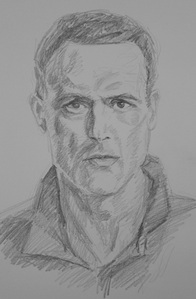 Note: This is a fictional interview between fictional characters. By Mary Atalia of The Seattle Globe I knew this would be an interview that would be difficult to pull off. Mark Porter is a private individual, but with all of the accusations swirling around lately, he felt obligated to come forward and clear his name. He was hesitant to meet at all, so I agreed to his location. We met at a bar in the Central District. Mary Atalia: Thank you for meeting with me. I realize you don’t typically talk to reporters. Mark Porter: There have been so many rumors running rampant that I felt I owed it to myself to clear the air. MA: Which rumors are you referring to? MP: That I’m stalking Olivia, of course. MA: Are you? MP: Of course not. We’ve been in a relationship for ten years. MA: Then why did she file a restraining order? MP: Someone put her up to that. And it’s no longer valid. She didn’t renew it. MA: But it’s not like someone can file on her behalf. She entered the paperwork. Interviewer’s Note: At this point in the interview, Mark dug through one of his pockets, making the gentlemen at the table next to us a little nervous. They only relaxed when they saw him push a rumpled piece of paper across the table. MA: What’s this? MP: It’s one of her love notes. MA: This looks a lot like a grocery list. MP: Over half of those ingredients are my favorite foods. And do you see how she crosses the t’s? Interviewer’s Note: Let the record show that the handwriting is pretty standard. MA: Were you recently in prison? MP: Not exactly. MA: How is that possible? MP: I don’t like your attitude. MA: I apologize. Let me rephrase the question. Did you serve time for committing a crime? MP: Yes. MA: Would you like to expand on that at all? MP: Not really. MA: Could you expand on it? MP: I did what I had to do. MA: Did the man you beat attack you? MP: No. MA: How did he provoke you? MP: He didn’t. I was considering my options when it occurred to me that I could get out of the army by getting into a physical altercation serious enough to warrant a discharge. MA: His injuries were so extensive he has had to relearn how to walk and perform simple motor functions. MP: And that is regrettable. But the army is no longer transferring me to Georgia. MA: Was it worth it? MP: Certainly. My Olivia - I see her all the time. That’s priceless. MA: So you don’t dispute that you committed the crime. MP: I already served time for it, so I don’t see the point. MA: You said that you and Olivia have been together for 10 years. Have you ever been on a date? MP: Of course! MA: Where did you go? MP: Just last weekend we went to the gym and the book store. MA: Did you get coffee or a meal? MP: She got a juice at the gym. MA: Did you get a juice with her? MP: I was busy. MA: Were you in the gym? MP: No, at the time I was in the car. MA: Did you ever go in the gym? MP: Of course. MA: When? MP: I don’t like your tone. What would your husband say about your questions? MA: He would probably say that I’m doing my job. MP: He must not provide very well. MA: I want to work. MP: I doubt that. MA: Olivia is very good at her job. She works. MP: That’s different. We aren’t married yet. Once we’re married, she’ll give up her job. MA: Gee, look at the time. Didn’t you say you had somewhere to be? MP: Yes, I’m meeting Olivia in five minutes. She’s cooking dinner. Interviewer’s Note: I love my job, but I’m not paid enough for this. By Camela Thompson
The advertisements for Stalker had me en garde - they were framed in such a way that appeared the detective squad's intent was to rehabilitate stalkers rather than protect their victims. While rehabilitation would be nice, I have a harder time relating to the people acting on a delusion than I do rooting for them to be caught. It's probably not the best mindset, but at least I'm honest. I was concerned that the show would romanticize stalking, but I was pleased with the actual content. In the grand scheme of things, having a stalker only took up a very small portion of my life, but it was traumatic enough to leave me jumping at every shadow for at least two years. The paranoia continued to a lesser extent. I was more guarded in college than most, which in certain circumstances served me well. I was always cautious around open containers, checked the seals on any bottled beverages, and was careful about where I parked and how I got home. I called myself "paranoid," but a lot of the behavior was smart. Watching the pilot episode of stalker brought back a lot of negative memories - and had me remembering some of those same habits - checking all of the locks, facing the door so I could see a shadow underneath, and the frustration I felt. Stalker did a great job of portraying the helplessness felt by victims. Many stalkers are smart enough to tiptoe along the line of a restraining order, just pushing far enough to intimidate without violating a law. There isn't much that can be done by law enforcement until an aggressor has done something menacing or physically harmed a person. A stalking victim is psychologically toyed with - predators get a rush from the control they exert over their victims. It isn't hard to get caught up in the fear that comes with wondering what is next. When is he/she going to violate the order? How far will he/she go? It's disruptive and anxiety inducing. The one aspect of the show that made me laugh was the existence of a unit in any police department that focuses on proactively preventing crime. A stalker unit. When I did some research online, there actually appears to be a Threat Management Unit in the LAPD. I was really surprised, but I still wonder how proactive the law allows them to be. Legal institutions are reactive by nature, which I see value in. It would be insane to start arresting people before they commit a crime based on some kind of probability model like Minority Report. Still, the Threat Management Unit is something I will be reading up on. I would be interested to see statistics around the efficiency of such a model. Have you seen Stalker? What did you think? Join me on Wednesday (10/15) for the launch of All the Pretty Bones. Excerpt from All the Pretty Bones by Camela Thompson Lucian frowned as he took in the woman standing in front of his security camera. Monday nights were always slow, and his clientele was nothing if not diverse, but he didn't expect to see the lone woman who carried herself like a formally trained ballerina standing on his stoop. The only dancers in the industrial neighborhood were the erotic kind who filled the strip club two doors down. The woman's hand fluttered up to her neck. He was about to hit the intercom to shoo her away when she looked up at the camera above the door. The world ground to a halt; there was only the small black and white screen that sat before him. He hadn't seen features so pure since the old country. Her hair was piled on her head, giving him a clear shot of her high cheekbones and full mouth. Those eyes were the clincher though―almond-shaped, light in color, and alight with determination. If she looked so alluring on a grainy colorless feed, he wasn't sure he would retain his composure in person. He had a sudden need to know why someone such as her would need service from an establishment such as his. The woman's graceful hand reached out to the intercom. "You must have the wrong address." The woman looked around, her eyes pausing in the direction of the strip club. Her face was momentarily illuminated in a strobe pattern matching the gaudy "Girls! Girls! Girls!" sign above the club's door. Instead of turning to leave, she angled her pretty face up to the camera and said, "I don't think so. I need help with a problem." There was a long pause while Lucian considered the tilt of her head on that slender neck. "What kind of problem?" "The kind that doesn't go away on its own." Her voice cracked somewhere between "go" and "on" as she hugged her arms to her chest. Those wide eyes called to him. She was not his typical customer and he doubted she had handled a weapon in her life. The best thing he could do for her would be to send her on her way. If he sold her anything, it would end badly for the beauty. The door buzzed loudly and he looked at his own hand deactivating the lock like it was a traitor. More About Lucian Dalca
With a prosperous arms dealing operation, Lucian keeps nocturnal hours and is naturally secretive. You don't succeed in a questionable line of business without a healthy distrust of people. When he sees Olivia on his doorstep, he momentarily forgets his cautious lifestyle. Is his reserved nature too deeply ingrained to let anyone in? Will his dark secret push her away? 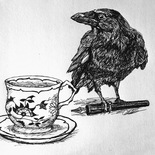 By Guest Blogger Z.D. Gladstone When I agreed to write a guest post for Camela on stalkers, it was with the understanding that I would be writing from a mental health perspective and not that of a novelist. Which is not to say that I am an expert on stalking. My background features a BA and an MA in psychology, as well as roughly a decade of experience working with youth and families struggling with mental illness and addiction. I never worked in an in-patient setting (read: hospital or similar) so my experience with previously diagnosed psychotic disorders was fairly limited. However, one of the insidious things about the kind of mental illness that can lead to stalking is how long it can fly under the radar. And I am very familiar with obsession, delusion, and the seeming inability to break unhealthy patterns of behavior. Stalkers are fascinating to average people (in a freaky way) because their mentality is so distant from our own. There is no single mental illness that results in the behavior known as “stalking,” although most stalkers would qualify for some kind of psychotic disorder. That’s because they typically suffer from some kind of delusion, which is central to any kind of psychosis. A delusion is a belief – a concrete, sure-as-gravity, unshakable belief – in something that is not true, and this causes significant personal and/or social distress. This delusion could be that the victim is in love with the stalker, or is cheating on the stalker, or intends to harm the stalker, etc etc. This is a topic that could (and has) fill multiple books. In this brief post, I will write about stalkers from two very different psychological perspectives: Freudian (because there’s just no beating the basics), and Behavioral. Please note that these will be very simplistic; both perspectives can offer far more complex and in-depth explanations than what we have room to explore in a blog. Freudian To the Father of Psychology, everything came back to early childhood experiences and the people most closely involved: the parents. Psychoanalysts believe the Mother is the first and most important female in the life of an individual. The love that an infant feels for his* mother is raw and all-encompassing, because his survival literally depends on its mutuality. It also blurs all kinds of sexual boundaries because the infant has not yet encountered most of the world’s social norms, which is why the Oedipal Complex evolves: the infant’s desire to kill the Father, and have the Mother all to himself. Freud believed that mental illness in adults was the result of unresolved issues in early childhood development—a concept we fully embrace today, although in a less Victorian-influenced framework. Through Freud’s perspective, the Stalker is an individual who never felt he received the necessary love and care from his mother, a rejection that could have proven fatal. This desperate, life-or-death emptiness remains in the unconscious mind into adulthood, until he meets someone who triggers those feelings. In the mind of the Stalker, This is the person who can fulfill me gets paired with This is the person with the power to destroy me. This becomes I need you, I want you all to myself, and also How dare you hurt me, I have to destroy you before you do it again. There’s nothing logical to it, because when these unconscious patterns are laid down the infant is incapable of logic; there is only raw, desperate need. And just as infants and toddlers are capable of illogical and horrible cruelty through their naiveté, so is the Stalker capable of these terrifying behaviors because he regresses to the infantile state of emotion. Behavioral Pure Behavioral Psychology is built on the idea that all animals – including humans – do things because they are rewarded for the action. There is only action and consequence. An infant cries, receives cuddles and food, and therefore will cry in the future because he wants the same reward. The reverse is true with punishment: a child touches a hot stove, burns his hand, and therefore will not touch a hot stove in the future. We use these principles to train our pets, teach our children, and even maintain international relations...with varying levels of success. So the simple explanation for stalking from a Behaviorist view is that the Stalker was at some point rewarded in some way for being around his victim. If he knows the victim personally (e.g. an ex-girlfriend or a co-worker) then their relationship was so powerfully rewarding that any closeness, any interaction triggers the same reward feeling. If he doesn’t know the victim personally – such as with a celebrity – his experiences in watching her shows/listening to her music/reading about her have been rewarding enough to inspire increased closeness. Even though the Stalker’s behaviors become strange and may result in punishment, the initial and lingering rewards are strong enough to overpower them. (If this seems illogical, just remember how many times you’ve had to punish your pet for eating out of the garbage.) These kinds of deeply ingrained patterns of behavior can be very difficult to break, because the Reward Systems are essential to survival, and – once again – defy logic. Conclusion While both of these perspectives are intriguing, it doesn’t take much pondering to realize neither displays the whole picture. Human beings are far too complex and diverse to be captured in any single psychological paradigm. Neurological imaging technology not yet been used in extensive research in the area of stalking, although some initial findings suggest the prefrontal cortex (right above the forehead) may not be doing its job of helping emotion and rational find common ground. But here’s what we DO know about the brain: the more often we repeat a thought or an action, the easier it is for the brain to repeat it. Like a popular bike trail where after a while, a rut appears, and that’s where the wheels just tend to go. Compare your handwriting now to what it was in the second grade—with repetition comes fluidity and ease. So the obsessive thoughts that feed stalking are self-perpetuating. Every time a Stalker allows himself to think about his victim, or look at her picture, or follow her, his brain becomes that much more likely to do it again. And again. And again. And whether that’s because of insufficient care when he needed it most in infancy, or because of a social reward he may or may not remember probably doesn’t matter that much to the person being stalked. *I will use the default male since the majority of stalkers are men, but it should be noted that women follow the same psychological patterns and are just as capable of committing the associated crimes. Z.D. Gladstone Z.D. Gladstone is an aspiring young novelist. Having spent most of her life in the Pacific Northwest, she whet her imagination on rainy afternoons--and her appetite on the warm, bustling kitchens of her family members. She uses her blog to share some of her creative work, both the literary kind (scribbles) and the culinary kind (munch). I would pretend that I don't like these chain blog posts, but it would be a total lie. Someone is spoon feeding me content. It's like wine tasting without the dizzies! This week's blog post is brought to you by the talented Michael G. Munz, a fellow Booktrope author of Zeus is Dead. 1) What am I working on? This question has been going through my head a lot lately because it's hard for me to focus on just one project. I have a New Adult Urban Fantasy series that just needs a few tweaks, but my focus has been on book 2 of The Hunted series (All the Pretty Bones was book 1) and my horror novel, Charlie's Shadow. I don't want to say much about book 2 because there are too many potential spoilers for book 1. Charlie's Shadow is about a struggling couple who finds a dog under their front porch. When they invite Charlie into the house, they get more than they bargained for. Things begin to go bump in the night and a dark secret about their house is discovered. My adorable inspiration for Charlie's Shadow  2) How does it differ from others in its genre? The Hunted series is in the Paranormal Thriller genre, but the focus is on the very human struggles the characters face. Olivia is tormented by a stalker and facing terminal illness. Sean Howard struggles with his need to save his ex and what the emotions being drudged up are doing to his marriage. Lucian has to decide whether risking his life is worth saving a woman who makes him feel alive. The mythology is important but it isn't the main focus. Charlie's Shadow is a horror novel, but it doesn't shy away from some difficult topics. Infertility and infidelity play major parts. Horror is often viewed as a "male" genre, but I believe Gillian Flynn has paved the way for a new twist with a heavy emphasis on contemporary issues. 3) Why do I write what I do? I get ideas in my head that nag until I finally just have to write them down. My mom has asked me why I write things that are so dark. She has always wanted me to pen a nice, cheery romance that takes place in Provence (I think a little bit of this desire stems from wanting an excuse to expense a "research" trip to France). I'm not sure why things get dark and twisty, but it seems to work for me. 4) How does my writing process work? It used to be that an idea would hit me and I would just sit down and write. The first time I sat down to write, I cranked out 70,000 words in a week. That sounds like bragging, but if people were allowed to read those words, they would see that they were terrible. Which is why no one is going to read them. Ever. Except my good friend, but she's been sworn to secrecy. Despite the horribleness of the words, it was a beginning! Now I let an idea tickle at my brain and I write down some ideas for major plot points. Then I move on to sketching out characters. By the time I sit down to write the first few chapters, I know how I want the book to end. That doesn't mean it always ends how I first envisioned it, but it seems to work better than locking myself in a room and free flowing. Now it's time to meet the next blog hop participants. Jennifer Hotes Encouraged by her mother-in-law, Elizabeth A. Hotes, who told her to create something and share it with others, Jennifer writes and illustrates to keep her memory alive. To date, Jennifer’s favorite medium is pen and ink, but she also loves to paint a wall or canvas. Her works have been featured at benefit art auctions, adorned the walls of public spaces, graced homes and enhanced books with vibrant covers and internal illustrations. Four Rubbings is Jennifer’s first novel, though she’s busy writing the second book in the stone witch series presently. Four Rubbings is great for readers that enjoyed the Harry Potter series, and has been a fun book club pick across the country. The author loves Skyping into book clubs, so email her and ask – she may just surprise you with a cyber visit! Jennifer Hotes'.......... Website | Twitter  Patricia D. Eddy Patricia D. Eddy can't stop writing. Not that she's tried. Her characters won't let her. She fuels her writing with copious amounts of caffeine-she lives in Seattle, after all-and rewards herself with good Scotch and red wine. In between writing, editing, and mentoring other authors, she runs around lakes, reads late into the night, and is terribly addicted to Doctor Who and Sherlock. She has a thing for quirky British men and isn't ashamed to admit it. Her quirky-but-not-British husband never gives her grief for working long hours or occasionally talking to herself when she has disagreements with her characters, for which she is very thankful. Patricia D. Eddy's...... Website | Twitter | Facebook |
Camela ThompsonFreelance writer and Dark urban fantasy author featuring vampires with bite. My BooksCategories
All
Archives
July 2020
|
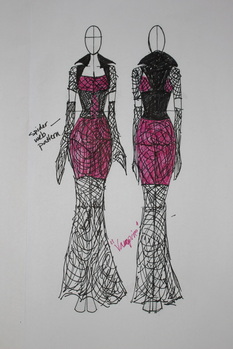
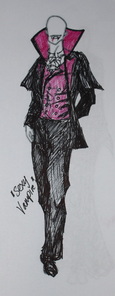
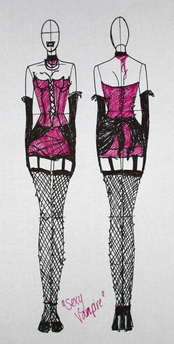
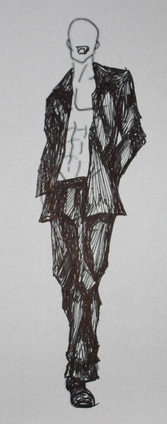
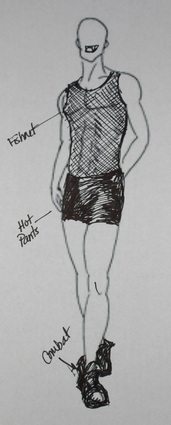
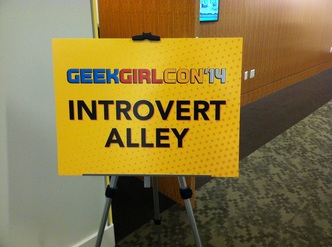
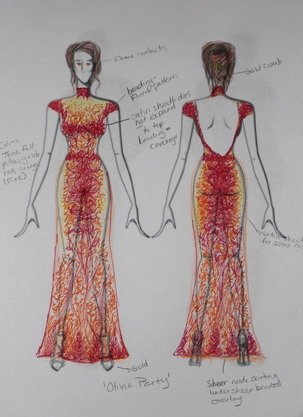

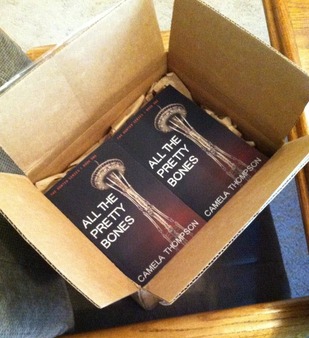
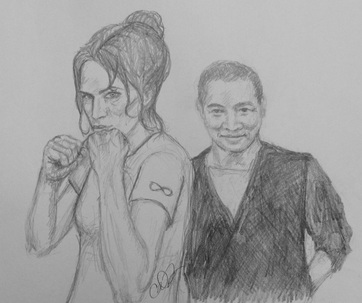
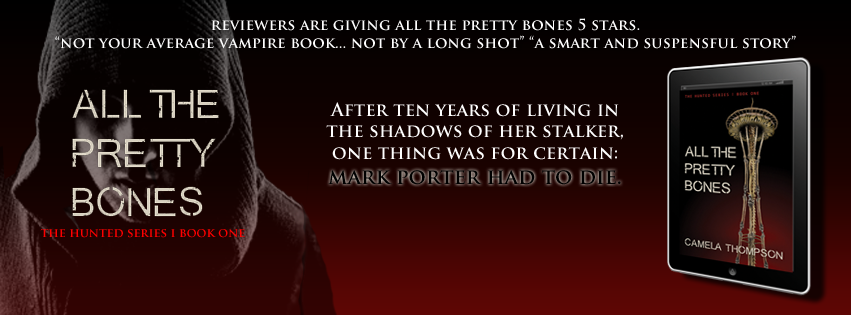
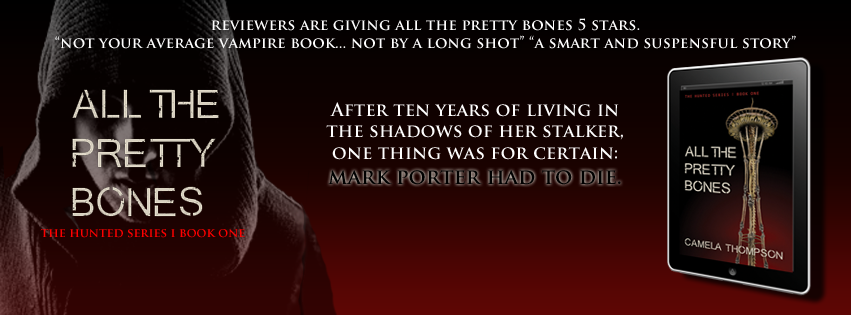

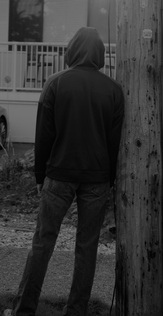

 RSS Feed
RSS Feed